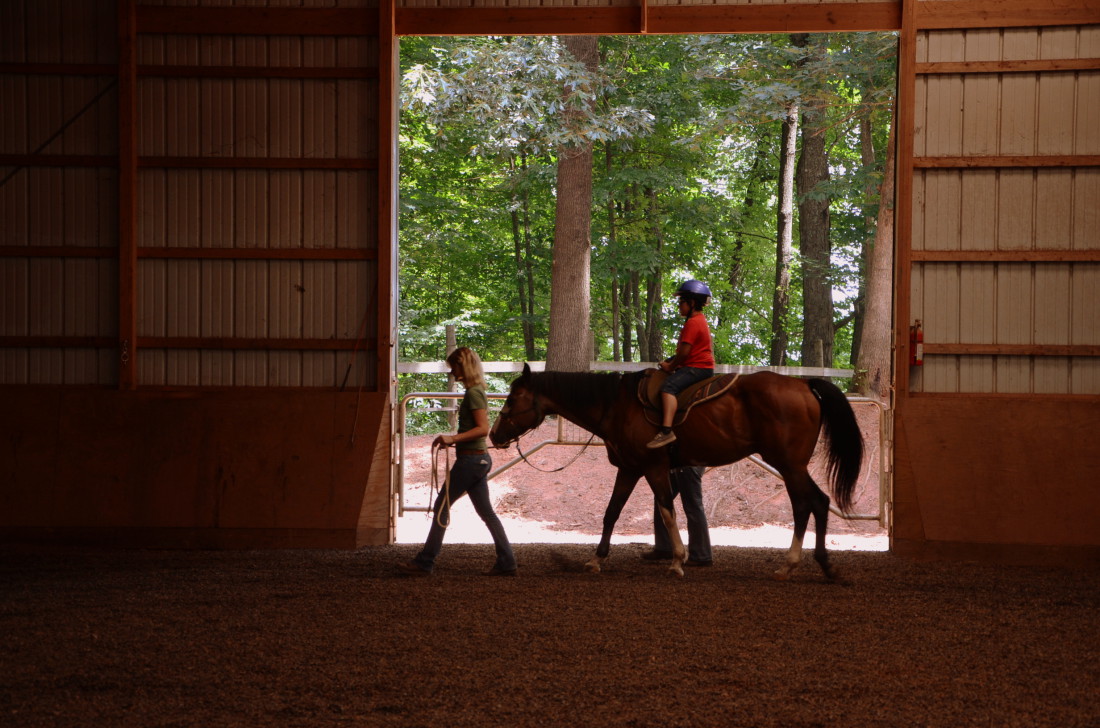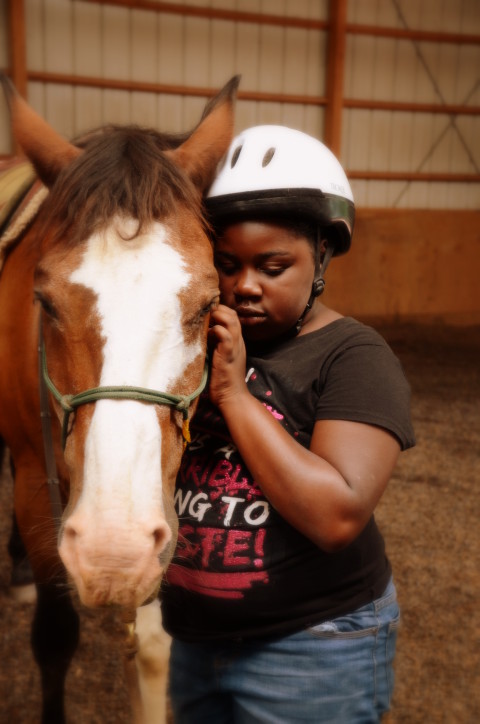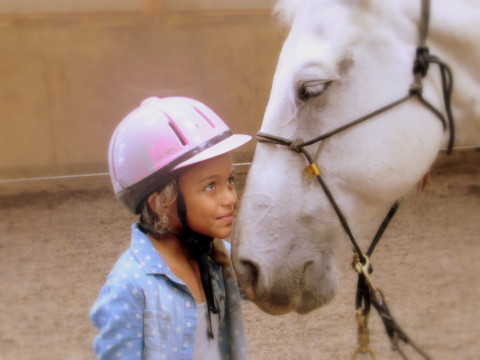Editor’s note: The names of the children in this story have been changed
“My favorite part was riding Hook,” says Alita. “I like how cool and chill he is — even though he didn’t know me. I will be friends with him for a long time.”
Alita did not start off feeling this way about Hook, or any of the horses. In fact, when she first arrived at Horse Sense of the Carolinas with Children First/Communities In Schools, she was very hesitant and clung to one of the site leaders. When she entered the ring area, she held back and was timid around the horses — as she had never met a horse in real life.
Staff introduced Alita to Hook, and the connection between the child and horse was almost immediate. Alita is a child who takes her time letting anyone into her circle of trust. Her respect is earned and not given freely or easily. But as soon as she met Hook, a friendship was formed “for the rest of our lives.”
Alita lives in public housing at Pisgah View Apartments, where the average annual family income is around $5,000. She is enrolled in Children First/Communities In Schools (CIS) Learning Center at Pisgah View, a safe haven for kindergarten through 5th graders living in the public housing and low-income communities of Deaverview, Pisgah View and Woodridge Apartments.
During the school year, Alita attends the Children First/CIS after-school learning center where she receives a healthy snack, homework help and an enrichment-activity. In the summer, she attends Children First/CIS Summer Camp program, where she spends the days hiking, swimming in pools and swimming-holes, mountain bike riding, performing stream investigations and riding horses at Horse Sense of the Carolinas.
“We are so excited about this partnership with Children First/CIS, as it fulfills our mission of utilizing experiential learning to support positive emotional, mental, behavioral and social skills” says founder and president of Horse Sense of the Carolinas Shannon Knapp. “Children can learn so much about themselves through their interactions with our horses. They learn that they have to be in a good place emotionally in order to communicate with our horses, and we teach them techniques to help get them into that good place. These are skills they can carry with them back into the home, into the classroom and into adulthood.”
Horse Sense of the Carolinas, located in Marshall, is an internationally recognized leader in the field of equine-assisted psychotherapy and learning. Horse Sense utilizes experiential learning to foster life skills and character development to support positive emotional, mental, behavioral and social skills of those who may be at risk or have special issues.
Part of this experiential learning offered to the children is their use of the emWave machine, developed by HeartMath. This machine runs a program that helps the viewer realize their stressors can be controlled through breathing and focus. During their visit, the children sit in front of a computer where their heart rate, breathing and focus is recorded by a device. As they look at the screen, an image appears. Based on how well regulated they are, the image on the screen changes colors, and they are able to proceed to various levels.
“This shows the children that they are in control of their behaviors,” says Margie Allison, a collaborative therapist at Horse Sense. “One [CIS] child was so controlled they she had everything lit up on the screen. Even I can’t do that.”
But the real magic happens with the horses. There is a hush in the riding ring, as the normally rambunctious children walk quietly up to their assigned horse and reach out their hand for a “horse-handshake.” The children talk in whispers as they gently pet the horses, a look of tranquility on their faces. There is almost a feeling of sacredness in the riding ring, as the silence is broken up only by an occasional neigh from the horses and the gentle murmurs from the staff. But if smiles had a sound, the riding ring would sing out like a symphony.
“I get goosebumps every time we come here,” says Barbara Norton, Children First/CIS Learning Center coordinator. “This experience is life-changing for these children. They are able to overcome their fears and discover qualities about themselves they didn’t know they had. I am so proud of them. When I see them sitting up so straight and proud in the saddle, I feel like I am going to cry with joy.”
She tells the story of Nikita, a rising 6th grader who has been in the Learning Center program since she was in kindergarten. Nikita has experienced challenges in her home life and is familiar with the struggles that come from food insecurity and crowded living-situations. Through the years, she has developed protective defenses where she doesn’t show her emotions freely.
“Nikita was very timid around the horses at first; but we talked about what she was experiencing, and I think that helped her get more comfortable,” Norton says. “She still wasn’t showing much emotion and stayed pretty guarded. But something shifted when she was able to be alone with her horse and started leading him around the ring. She had a smile on her face that I haven’t seen in a very long time.”
“Communication is key,” says Knapp. “The children are taught to breathe slowly and intentionally in a calm way, and that is how they communicate to their horse to stop and go, turn left or right. It is a subtle but very effective form of communication, and I think it is powerful for the children when they see it work.”
After riding the horses, the children sit in a quiet space and write in their journals — reflecting on their experience and capturing it with words. This writing component is instrumental in helping alleviate the summer learning-loss that is disproportionately concentrated among low-income students during summer months. “The children really form connections with their horses, and this connection helps give them a strong subject to write about,” says Children First/CIS site leader Andrea Gottschalk. “For the days following their time at Horse Sense of the Carolinas, they constantly talk about their horses, draw pictures and write stories about them.”
Asked for one word to describe their time at Horse Sense, the children said “awesome, amazing, and superfantastic.” They don’t know of the paperwork and planning that goes into making these experiences possible. They only know the joy and pride they feel as they are sitting tall in the saddle and making a new friend for life. Every child deserves to have opportunities to help them discover their strengths and skills, and partnerships between Children First/CIS and Horse Sense of the Carolinas provide those opportunities.
Would you like to help make this experience possible for local children? Donate to the Heart of Horse Sense for Veterans and At-Risk Youth at heartofhorsesense.org/donate-now
For more information contact Knapp at HeartofHorseSense@gmail.com or 683-7304, or contact Kaitlyn Breiten, Children First/CIS Resources development coordinator at 259-9717 or KaitlynB@childrenfirstbc.org.
About Children First/Communities In Schools of Buncombe County
Children First/Communities In Schools of Buncombe County is a local non-profit that provides programs to economically disadvantaged children & families. Children First’s mission is to empower children and their families to reach their full potential through advocacy, education and services. The mission of Communities In Schools is to surround students with a community of support, empowering them to stay in school and achieve in life. Outreach and Engagement Coordinator Jodi Ford can be reached at 620-9091. Find out more at childrenfirstcisbc.org






http://www.lily-lane.co.uk/robertomjunior/bf205-61381-14.htmlティファニー 食器,ティファニー 婚約指輪 カラット,ニナリッチ 香水 レベルドゥリッチ
ティファニー ピアス オープンハート,ティファニー 指輪 婚約,ニナリッチ 香水 アーモンド http://cardinalph.co.za/wp-fany/ed83f-51391-89.html
http://smallactsofdevotion.com/robertomjunior/cb557-11383-31.html少女時代 ティファニー インスタ,ティファニー ピアス シルバー,ニナリッチ ハンカチ
ティファニー 店舗 アウトレット,ティファニー 指輪 婚約,ニナリッチ 財布 小銭入れ http://tallerdeblogs.lavozdegalicia.es/robertomjunior/d9fbb-71387-59.html